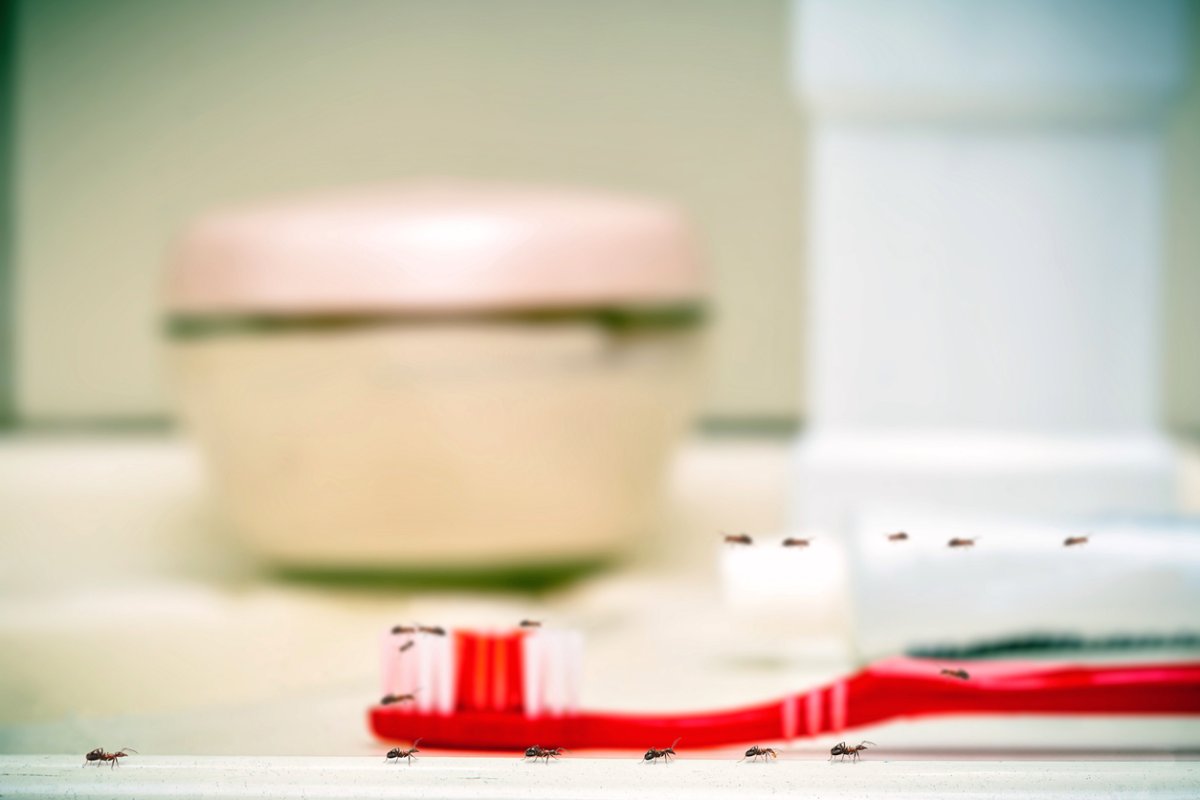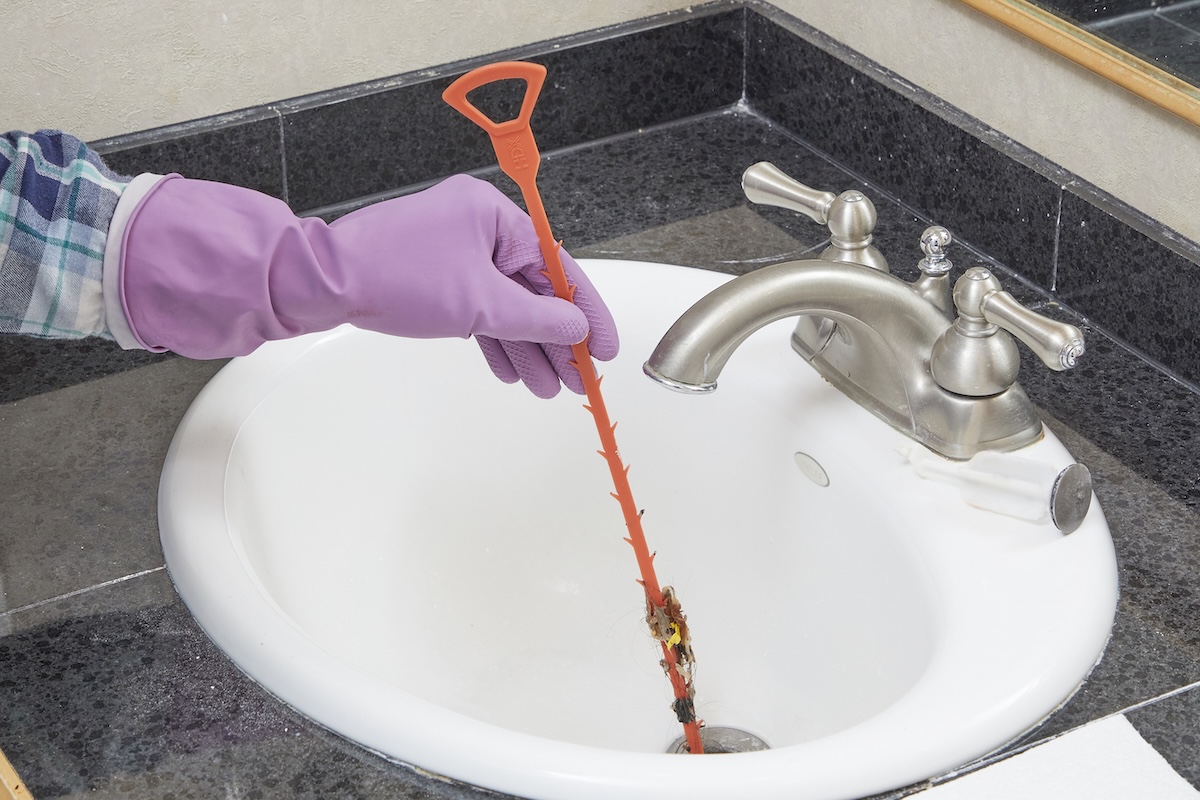

We may earn revenue from the products available on this page and participate in affiliate programs. Learn More ›
Spotting ants in the bathroom can be unsettling, but it’s a common problem for homeowners and renters. Bathrooms have three things ants need—moisture, food sources, and shelter—which is why they are frequent targets for these persistent pests.
Fortunately, there are simple steps you can take to eliminate ants and keep them from coming back. By understanding what attracts ants to bathrooms and using the right prevention and treatment methods, you can reclaim your space and stop future infestations before they start.
Why are there ants in my bathroom?

Though you might think that ants would always prefer kitchens, bathrooms also give ants everything they need to survive: moisture, food, and shelter. Here are the most common reasons these pests are drawn to the space:
Moisture and Humidity
Bathrooms are naturally damp, so they’re the ideal environment for ants. Leaky faucets, clogged drains, or water sitting in tubs and sinks provide easy and consistent water sources.
Food Sources
From toothpaste residue and spilled liquids to crumbs near the sink or trash can, bathrooms can be a pretty good meal spot for ants. Even shed hair and dead skin cells that accumulate over time might serve as a food source.
Fragrant Products
Ants have a strong sense of smell and can be lured in by scented products like perfumes and soaps. Even toothpaste often contains sweetening agents that draw ants in.
Dirty or Damp Items
Neglected floor mats, trash cans, and drains can attract ants if they’re left dirty or damp. Organic matter, dirt, and grime that build up in these areas might sustain entire colonies.
Easy Entry Points
Tiny cracks in tile grout, gaps around plumbing, or openings near windows make it easy for ants to get inside. Finding and sealing entry points can help block their entry.
Keeping the bathroom clean and dry, wiping away standing water, and regularly emptying trash cans are simple steps that make your bathroom far less appealing to ants.
Ways to Get Rid of Ants in the Bathroom

Once ants make their way inside, it can take more than a quick wipe-down to get rid of these bugs. The key is to get rid of what’s attracting them, plus deal with how they’re getting in. Here are the most effective ways to tackle an ant infestation in the bathroom.
- Seal entry points: Check for cracks in tile grout, gaps around plumbing, or openings near windows and baseboards. Use caulk or weatherstripping to block these small passageways so ants can’t get inside.
- Repair leaks: Ants are drawn to water, so fix any leaky faucets, shower heads, or pipes that create excess moisture. Even a slow drip can provide ants with a steady water source.
- Deep-clean the bathroom: Scrub away residue on sinks, tubs, and counters, and mop or vacuum regularly to remove crumbs, hair, and dead skin cells. Don’t forget to empty and disinfect trash cans and wash or replace damp floor mats.
- Check your toiletries: Keep toothpaste caps closed, wipe bottles and soap containers, and avoid leaving food or sugary drinks in the bathroom. Sealing or removing these items stops them from being an easy food source.
- Use natural remedies: Common household items like white vinegar, boric acid, borax, citrus peels, cayenne pepper, coffee grounds, or essential oils (peppermint, tea tree, lemon) can help deter ants. These natural methods are safe and eco-friendly, though they might require frequent reapplication and may not stop larger infestations.
- Set traps or use insecticides: Ant traps and baits can intercept ants along their trails, while liquid or powder insecticides provide stronger control for serious infestations. Always follow label directions carefully to ensure safe and effective use.
How to Prevent Ants in Your Bathroom

Keeping ants out of the bathroom comes down to reducing moisture, removing food sources, and staying on top of cleaning. These steps can make your bathroom far less appealing to pests:
- Reduce moisture: Wipe up puddles promptly and run the exhaust fan during showers to cut down on humidity. If steam still lingers, consider adding a small dehumidifier to the space.
- Clean regularly: Scrub tile grout, behind the toilet, and other hidden corners where dirt and debris build up. A consistent cleaning routine helps remove organic matter that could attract ants.
- Empty the trash: Bathroom trash often contains wrappers, tissues, or organic waste. Emptying it regularly prevents ants from finding a convenient food source.
- Clear the drains: Clogged drains hold stagnant water and odors that can lure ants. Keep drains clear with regular cleaning to minimize buildup and standing water.
- Wash or replace floor mats: Damp, dirty mats provide both shelter and food particles for ants. Toss them in the wash regularly or replace them if they stay musty.
- Store products properly: Keep caps on toothpaste, lotions, and soaps tightly closed. This prevents ants from being drawn into the bathroom by sweeteners or fragrances.
When to Call Pest Control for an Ant Infestation
If ants keep coming back to your bathroom despite your best efforts, it might be time to call in a professional. Pest control companies have the expertise, tools, and treatments needed to target ant colonies at the source and prevent them from coming back.
A professional exterminator will inspect your bathroom and the surrounding areas to identify where ants are nesting, what type of ants you’re dealing with, and the most effective treatment plan. They can also provide long-term prevention strategies tailored to your home.
For many homeowners, the cost of hiring a pest control service is worth the peace of mind and lasting results. If your ant problem is persistent, severe, or spreading beyond the bathroom, professional help is often the fastest and most reliable solution.
FAQ
Yes, ants can come up through the drain if the plumbing system has cracks or gaps that allow them to access the bathroom.
Ants dislike strong smells such as vinegar, peppermint, or lemon, so using these scents as natural deterrents might help keep ants at bay.
Although bleach can kill ants on contact, it might not be effective in eliminating an entire colony since it does not address the underlying cause or nest.
Ants in the washroom can come from various sources, including entry points such as gaps around pipes, cracks in tiles, or from nests located nearby, often within walls or outside the home.
Trails of ants, small piles of dirt or debris near cracks, and recurring ants around sinks, drains, or trash cans indicate an infestation.
Sugar ants, carpenter ants, and odorous house ants are the most common species that show up in bathrooms. Small ants in the bathroom also can include tiny pharaoh ants, which are light yellow or red.
